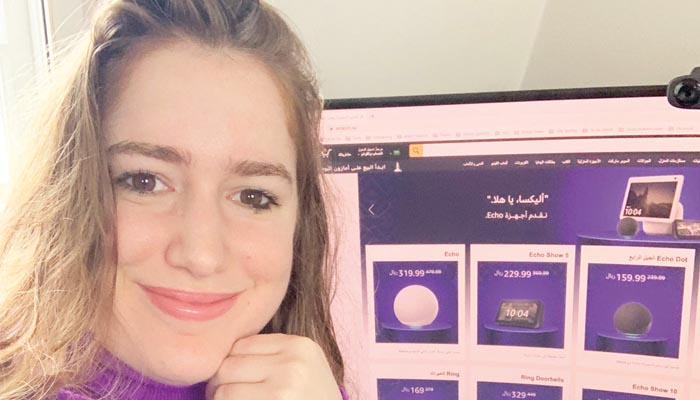
Muscat: An Omani engineer who worked on providing Amazon’s Alexa virtual assistant with the ability to recognise and understand Arabic speech has spoken about the efforts taken by her team and her to make Alexa smarter by making it understand more local words and slang.
Deena Shahrabani, a knowledge engineer who works from the UK for Amazon, was one of four members tasked with helping Alexa understand Khaleeji Arabic, the version of the language spoken in the Gulf. Alexa users in the United Arab Emirates and Saudi Arabia can now issue commands in Arabic, with the service soon to be rolled out among other Arab countries as well.
Deena explained, “We do recognise the various ways customers can ask questions, so we try to be as inclusive as possible to capture the most common shapes in different dialects, so you could be understood if you use the Egyptian way of asking ‘how many’. However, in terms of speech, we only speak Modern Standard Arabic and Khaleeji.
“Context is very important in understanding all languages with Alexa, and Arabic is no exception,” she added. “We have a team of data analysts and knowledge engineers who manually review any machine translated text and ensure we have a good level of accuracy there. We constantly aim to enrich Alexa with more culturally-specific idioms and phrases and I think that is definitely an area we can work on now that we have launched in two countries.”
Deena was one of four initial members tasked with improving Alexa’s knowledge of Arabic: she was joined by another knowledge engineer in London, a product manager in Dubai, and a data analyst in Cambridge. That team was supported by other core units, including specialists in automatic speech recognition (ASR), natural language understanding (NLU), and text to speech (TTS).
Other engineers, who were assigned to Alexa’s responses to commands regarding prayer times, smart home functions, and alarm calls, were also part of the team.
“My role involves building the question and answering capabilities of Alexa and improving her knowledge in multiple topics including prayer times, football, and Politics,” said Deena. “So if you ask in Arabic, ‘Alexa, when does Saudi Arabia Play?’ you should hear the answer I defined.”
“I made sure that Alexa understands each component of that phrase and provides the appropriate response to ultimately provide the best customer experience,” she added. “I also worked closely with the product team to ensure we target the highest-traffic utterances, as well as with our software engineering team to ensure we solve any nuances with Arabic that need code modifications, for example, in terms of the understanding of various dates.”
Born and raised in Muscat after her father, Dr Rashid Shahrabani, moved from the UK in 1988 to set up the Royal Hospital’s cardiology centre, Deena and her family were granted Omani citizenship in 2000, when she was just four years old. She graduated from the Sultan School, and joined Amazon in 2019, as part of their Graduate Retail Programme. Realising she wanted a more technical role, however, Deena joined the Alexa International team a year later to help launch Alexa in Arabic, which she says is one of the hardest languages to learn.
Her native connection to the language and keenness to take on the responsibility thrust upon her attracted Deena to the role, but fresh challenges came in the form of the hurdles brought up by the COVID-19 pandemic.
“Late nights are not unheard of when working on hard projects that might also require working with colleagues in California,” she admitted. “It is quite flexible and I really felt the autonomy to work at your own time at Amazon as long as the job is done. Flexible working is probably the best thing to come out of the pandemic - although it can go the other way.”
“We started work-from-home at Amazon in the UK quite early on in March 2020, and since have not been required to work in the office,” she added. “As my team is really global, I think working remotely is quite the norm with most meetings held virtually. Travel is one thing that affected us as quarterly off-sites were something unique about the role, where we’d all meet in a certain city every few months and reconnect with our colleagues.”
Deena revealed, “My job was very exciting but not easy by any means: Arabic was the first right-to-left language we launched, and there were many nuances unique to Arabic such as diacritics which increase the number of homonyms greatly. Disambiguating different words that share the same spelling was an important part of the launch.”
Having now established herself at one of the world’s biggest tech companies, and on the forefront of cutting-edge innovation, Deena has some advice for other Omanis, who want to make a name for themselves.
Selling points
“Definitely focus on your unique selling points,” she said. “I have always searched for Arabic-speaking roles when looking at jobs abroad as I knew it would give me an edge. The UK is not the easiest of countries to sponsor international applicants, so I would definitely focus on nailing a few years of experience in your home country, before applying for a global transfer or an application abroad.”
“Continuously learning and building your confidence through online courses is definitely a plus,” she added. “I think tech roles are still the most demanded among professions, and having a good foundation will help you sail forward.”